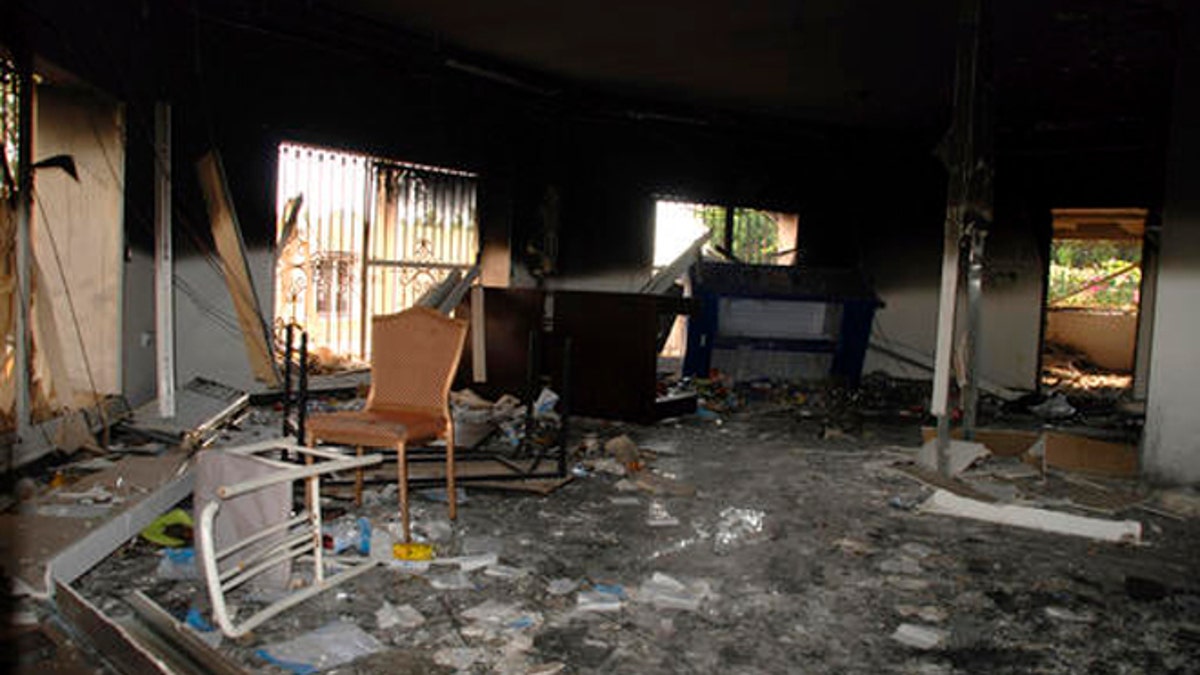
In this Sept. 12, 2012 file photo, glass, debris and overturned furniture are strewn inside a room in the gutted U.S. consulate in Benghazi, Libya, after an attack that killed four Americans, including Ambassador Chris Stevens. (AP Photo/Ibrahim Alaguri)
WASHINGTON – The Justice Department will not seek the death penalty against Ahmed Abu Khattala, the suspected Libyan militant charged in the Benghazi attacks that killed a U.S. ambassador and three other Americans, federal officials announced Tuesday.
The department revealed its decision, which pushes the case forward toward trial, in a brief court filing that offered no additional explanation.
In a separate statement, spokeswoman Emily Pierce said Attorney General Loretta Lynch made the decision after reviewing the case and consulting with federal prosecutors. She said the department is "committed to ensuring that the defendant is held accountable" for the 2012 attacks.
Abu Khattala's attorneys, who have challenged the strength of the government's evidence, had implored the Justice Department to remove the death penalty as a possibility should he ultimately be convicted of any capital crimes at trial. With that punishment now off the table, he would face a maximum sentence of life in prison if found guilty.
"It was a decision that was the correct decision, but was also a courageous decision — so we're pleased," one of his attorneys, Eric Lewis, told The Associated Press.
Abu Khattala, captured by U.S. special forces in Libya two years ago and brought to the U.S. aboard a Navy ship, has been awaiting trial in federal court in Washington in connection with the September 2012 violence at a diplomatic compound in Benghazi. Prosecutors have described him as a ringleader of the attacks, which quickly emerged as a political flashpoint and became the topic of congressional hearings involving Democratic presidential candidate Hillary Clinton, secretary of state at the time of the rampage.
Assuming it doesn't resolve through a plea agreement, a trial of Abu Khattala would represent of the most significant terrorism prosecutions in recent years and also an illustration of the Obama administration's commitment to prosecuting suspected militants captured overseas in U.S. civilian courts.
The 18-count indictment arises from a burst of violence that began the night of Sept. 11, 2012, at a State Department diplomatic compound, an attack prosecutors say was aimed at murdering American personnel and plundering maps, documents and other property from the post.
U.S. Ambassador Chris Stevens was killed in the first attack at the U.S. mission, along with Sean Patrick Smith, a State Department information management officer. Nearly eight hours later at a CIA complex nearby, two more Americans, contract security officers Tyrone Woods and Glen Doherty, died in a mortar attack.
Abu Khattala has pleaded not guilty to charges including murder of an internationally protected person, providing material support to terrorists and destroying U.S. property while causing death.
The case is likely to continue to focus fresh attention on security at the diplomatic compound, an issue that provoked immediate political concern and was the subject of a daylong hearing last year organized by a congressional select committee investigating the attacks.
Since arriving in the United States, Abu Khattala has made multiple court appearances alongside his lawyers. He sought unsuccessfully to have the case against him dismissed last year, and a separate request for him to be returned to Libya was also denied.
The Justice Department's decision comes at a time of heightened scrutiny of death penalty protocols at the state and federal levels, although a federal jury in Boston last year sentenced Boston Marathon bomber Dzhokhar Tsarnaev to death after the Justice Department sought that punishment. He is being held at the Supermax federal prison in Colorado.
Executions in the federal system are exceedingly rare; the last federal defendant put to death was in 2003, according to the U.S. Bureau of Prisons.
The Justice Department has said it is reviewing the policies, though nothing has been publicly announced, and President Barack Obama has said he's "deeply concerned" about the death penalty's implementation.
At her January 2015 confirmation hearing, Lynch said she thought the death penalty still can be an effective punishment.




